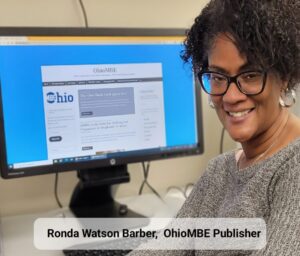By Ronda Watson Barber
OhioMBE Publisher
As a staunch advocate for Black businesses, I firmly believe that our enterprises should be deeply embedded in the business fabric of Columbus, especially when taxpayer dollars are involved. The region is witnessing an unprecedented construction boom, presenting a prime opportunity for inclusion and diversity in this thriving industry.
Recently, I launched an initiative aimed at introducing Black women in the construction sector to local construction companies. The program has been an overwhelming success. Our networking tour has made stops at Kokosing Construction and Marker Construction, and this Thursday, we will be visiting Pepper Construction. These events not only foster resource sharing and networking among women but also provide valuable insights on how to do business with these companies. Our hosts have graciously provided lunch and shared their business strategies.
I extend my heartfelt thanks to our construction partners. They are actively engaging with a diverse group of women, creating economic opportunities, and demonstrating the importance of inclusivity. These companies understand that supplier diversity drives innovation and competitive pricing, benefiting the overall community through economic development and job creation. They are OhioMBE’s inclusion partners.
Despite these successes, Black-owned businesses still face significant challenges, particularly with Columbus City Schools. Tonight, the elected board of education will be presented with the school closure plan. Following the passage of the $100 million permanent property tax levy, the district proposes to spend $60 million annually on building maintenance and upgrades. However, there is a glaring concern: How is the district including Black taxpayers in these projects?
I am deeply troubled by the district’s apparent disregard for its local inclusion policy. There seems to be a lack of meaningful outreach to involve local Black vendors. During a supplier diversity summit, Alex Trevino, the Director of Capital Improvements, labeled Columbus as “A City of Poverty” in front of a room filled with Black taxpayers, many of whom have children attending the largest public school district in Ohio. This statement underscores the pressing need for the district to present a comprehensive plan detailing its supplier diversity efforts for the proposed $60 million expenditure.
The district has a moral obligation to reinvest in the Black community that funds its tax revenue. It should dedicate as much effort to its supplier diversity plan as it does to closing schools. With a concerted focus on inclusion and supplier diversity, CCS can help Columbus can shed its “City of Poverty” label and emerge as a beacon of economic equality and opportunity.
Let’s continue to push for accountability, transparency, and inclusivity. Together, we can ensure that our tax dollars foster a thriving, diverse, and equitable business environment in Columbus.
just my thoughts…rwb
